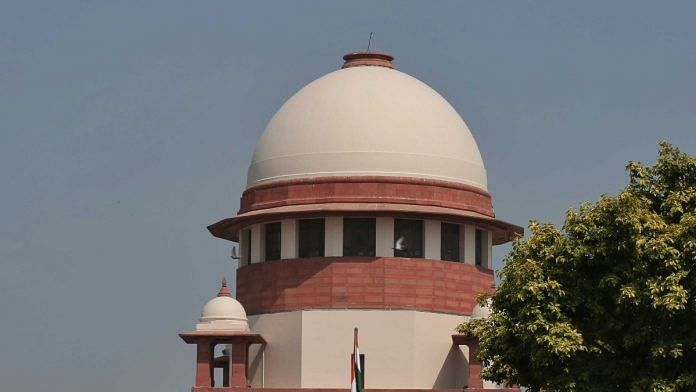New Delhi: In a landmark decision, the Supreme Court Monday held that “default bail” could be cancelled even after investigating agencies file their chargesheet, provided there was a strong case for it.
Default bail is bail given to an accused if the investigating agencies fail to file their chargesheet in time.
“There is no absolute bar that once a person is released on default bail, it cannot be cancelled on merits and grounds like not cooperating with the police investigation,” a bench of justices M.R. Shah and C.T. Ravikumar held while hearing the high-profile Y.S. Vivekananda Reddy murder case.
Section 167 of the Code of Criminal Procedure (CrPC) 1973 provides for default bail. The law says an accused is entitled to bail if investigation agencies fail to wrap up their probe and file chargesheets within a prescribed period.
Although the law remains silent on the subject, courts, as a matter of practice, don’t set aside an accused’s default bail even after the chargesheet is filed.
The Supreme Court’s decision came on the back of a petition by the Central Bureau of Investigation (CBI), which was asking for the bail of Erra Gangi Reddy, a suspect in the murder of Congress leader Y.S. Vivekananda Reddy, to be cancelled.
Y.S. Vivekananda Reddy, the uncle of current Andhra Pradesh Chief Minister Y.S. Jagan Mohan Reddy, was stabbed to death in March 2019.
The CBI had approached SC to appeal against the Telangana High Court’s refusal to consider its application.
In its verdict Monday, the court asked the HC to hear CBI’s application on merit.
However, even as it cleared the air on the subject, the court laid down that the mere filing of a chargesheet is an insufficient reason for the cancellation of the bail. Instead, it outlined the grounds on which a court can consider such cancellation.
Also Read: How US & UK made bail the rule, jail the exception, and why SC wants specific law in India
What the law says
Section 167 of the CrPC provides an indefeasible right of bail to the accused on the default of investigators — that is when the investigating agency fails to file a chargesheet.
The law states that an arrested person must be brought before a magistrate within 24 hours of their arrest. On their part, the magistrate will then send a suspect to either police custody or judicial custody.
The law prescribes a deadline for investigation agencies to complete their investigation — 90 days for offences punishable with death, life imprisonment, or 10 years of jail; and 60 days for other offences.
However, special laws such as the Narcotic Drugs and Psychotropic Substances Act, 1985 (NDPS Act) and the Unlawful Activities (Prevention) Act, 1967 (UAPA) provide an extended period of investigation, with custody even going up to a year in the case of the former.
It’s important to note that this bail, unlike anticipatory bail or regular bail, is not granted on the merits of the case.
‘Inculcate a sense of its urgency’
In its verdict Monday, the SC noted that the object of Section 167 was to ensure that investigations are finished expeditiously.
“The object and purpose of proviso to Section 167(2) CrPC is to impress upon the need for expeditious investigation within the prescribed time limit and to prevent laxity on that behalf. The object is to inculcate a sense of its urgency and on [the] default the Magistrate shall release the accused if he is ready and does furnish bail,” the court said.
The bail under the section isn’t provided on the merits of the case but when investigating agencies fail to file a charge sheet within the prescribed period, the Bench said, adding that lethargy could creep into investigating agencies if merits are considered immaterial to granting bail.
The court relied on a 1992 Supreme Court decision that had held that while default bail can’t be cancelled on mere filing of a chargesheet, it could be done when “strong grounds” are disclosed from the chargesheet.
“Therefore, there is no absolute bar as observed and held by the High Court in the impugned judgment and order that once a person is released on default bail under Section 167(2) CrPC, his bail cannot be cancelled on merits,” the court said.
‘Merits key ground to consider cancellation’
The court held that for the default bail to be cancelled though, merit of the case alone can decide. For this, it laid down the grounds for cancellation.
The court said bail can be cancelled only when the defect due to which the bail was granted in the first place is cured and strong reasons are made out against the accused in the case of non-bailable offences.
Since default bail is not given on the merit of the case, a court can cancel it provided strong grounds are made “demonstrating commission of non-bailable offence by the prosecution from the chargesheet”.
The court said that to accept the argument that default bail cannot be cancelled would be a “travesty of justice” and could send out the message that “investigating officers are hand-in-glove with the accused”.
“The courts will loathe for such an interpretation, as that would frustrate the justice. The courts have the power to cancel the bail and to examine the merits of the case in a case where the accused is released on default bail and released not on merits earlier. Such an interpretation would be in furtherance to the administration of justice,” the SC bench said.
Akshat Jain is a student at the National Law University, Delhi, and an intern with ThePrint.
(Edited by Uttara Ramaswamy)
Also Read: ‘What prevailed upon him?’ SC wants to know after HC judge rejects over 40 bail pleas in a day



